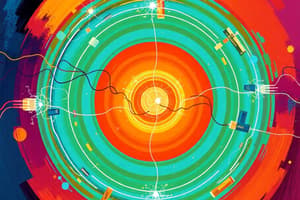Podcast
Questions and Answers
What is the relationship between electrical energy (E), voltage (V), current (I), and time (t)?
What is the relationship between electrical energy (E), voltage (V), current (I), and time (t)?
- E = I/Vt
- E = VIt (correct)
- E = VI/t
- E = V/tI
What is the unit of electrical energy (E)?
What is the unit of electrical energy (E)?
- Coulomb
- Volt
- Joule (correct)
- Ampere
What is the condition for 1 joule of electrical energy to be used?
What is the condition for 1 joule of electrical energy to be used?
- 1 A of current flows through a device with a potential difference of 1 V for 1 s (correct)
- 1 A of current flows through a device with a potential difference of 0.5 V for 2 s
- 2 A of current flows through a device with a potential difference of 1 V for 2 s
- 2 A of current flows through a device with a potential difference of 0.5 V for 1 s
How is the amount of charge (Q) related to current (I) and time (t)?
How is the amount of charge (Q) related to current (I) and time (t)?
What is the formula for potential difference (V) in terms of electrical energy (E) and charge (Q)?
What is the formula for potential difference (V) in terms of electrical energy (E) and charge (Q)?
Flashcards are hidden until you start studying
Study Notes
The Relationship between Electrical Energy, Voltage, Current, and Time
- The formula for potential difference is V = E/Q, where V is the potential difference, E is the electrical energy, and Q is the amount of charge flowing.
- Electrical energy (E) can be expressed as E = VQ.
- The amount of charge flowing (Q) is equal to the product of current (I) and time (t), denoted as Q = It.
- Therefore, the relationship between electrical energy (E), voltage (V), current (I), and time (t) can be formulated as E = VIt.
- The S.I. unit for electrical energy (E) is the joule (J).
- 1 joule (J) is the electrical energy used when 1 ampere (A) of current flows through an electrical device with a potential difference of 1 volt (V) across it for 1 second (s).
Studying That Suits You
Use AI to generate personalized quizzes and flashcards to suit your learning preferences.




